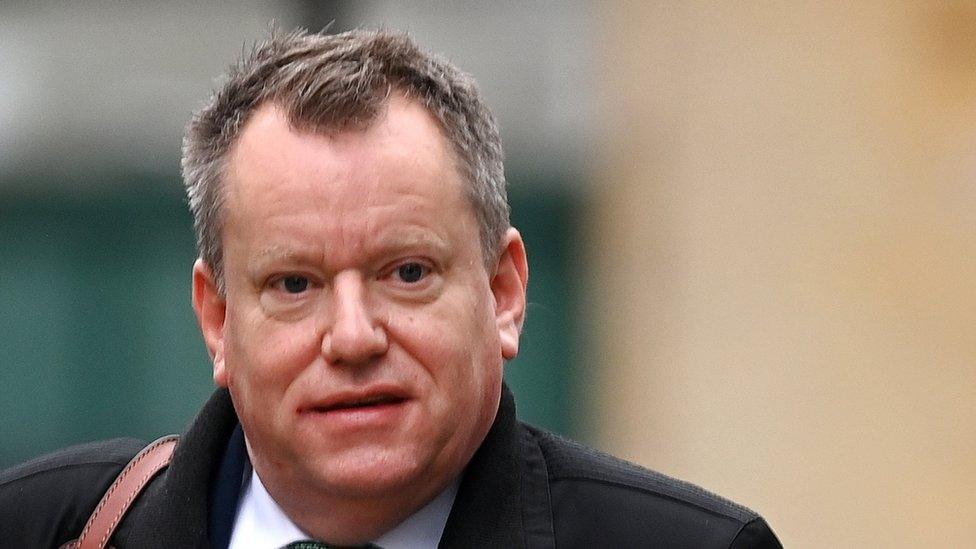No 10 replaces Frost as National Security Adviser days before he starts
- Published

Lord David Frost was due to start as National Security Adviser on Monday
Downing Street has appointed a new National Security Adviser days before Lord David Frost was due to start.
The chief Brexit negotiator was meant to take up the post on Monday, but will now be replaced by the Ministry of Defence's Sir Stephen Lovegrove.
No 10 faced criticism over Lord Frost's appointment in June last year, with former PM Theresa May saying he had "no proven expertise" in the area.
Now he will be the PM's representative on Brexit and International Policy.
A statement from Boris Johnson did not explain why Lord Frost was changing roles.
But the prime minister said he was "thrilled" Lord Frost had accepted the new post, and that Sir Stephen would bring "a wealth of experience from across Whitehall and in national security".
Labour's shadow home secretary, Nick Thomas-Symonds, said "chaos and confusion" in government had led to a "significant delay" in filling the important role.
He added: "Getting such a crucial appointment wrong, in the face of warnings, shows a worrying error of judgment by the prime minister on the crucial issue of our country's safety."
Lord Frost was announced at the successor to Sir Mark Sedwill in June 2020, after the UK's top civil servant said he would step down from his joint role as National Security Adviser and Cabinet Secretary.
The former diplomat was due to take on the job in August, but after delays to Brexit negotiations, his start date was moved to 1 February 2021.
No 10 was criticised for putting a political appointee into the role, rather than a civil servant, with Labour calling the move "dangerous".
Mrs May - who appointed Sir Mark into the role when she was PM - said she had "listened to the expert, independent advice from national security advisers" when in Downing Street, asking: "Why is the new national security adviser a political appointee with no proven expertise in national security?"
Theresa May asks why is the new national security advisor is a “political appointee with no proven experience"
Former Foreign Secretary and ex-Tory leader Lord William Hague also raised concerns about the decision, saying while Lord Frost was "highly capable", the role was better suited to someone with first-hand experience of security operations.
But Cabinet Office Minister Michael Gove defended the appointment, saying Lord Frost was a "distinguished diplomat in his own right".
He added: "It is entirely appropriate that the prime minister of the day should choose an adviser appropriate to the needs of the hour."


Lord Frost's appointment as National Security Adviser did raise a fair few eyebrows in Whitehall, not to mention temperatures in the House of Commons.
Theresa May's searing criticism reflected concerns that he was too politically tied to the prime minister, whilst being inadequately informed on national security issues.
But Michael Gove defended the decision last summer, suggesting that not all national security advisers had necessarily been "steeped in the security world" and that Lord Frost, a former diplomat, met "the needs of the hour".
Many hours have passed since then, so what's prompted today's move?
Some may see this change of heart as part of a wider changing of the guard at Downing Street.
Since the departure of chief aide Dominic Cummings, No 10 has appeared a little more conventional and a little less inclined to take on the so-called "establishment".
However, Whitehall sources suggest that it's more to do with Brexit.
A trade deal may have been reached, but there's recognition that things aren't really "done and dusted" when it comes to arrangements on, for example, financial services.
Lord Frost, I'm told, will also be taking a close look at how the UK might diverge from EU rules in future.
And while his new role is still somewhat undefined, perhaps there was recognition too that it's a more obvious fit for a man that Boris Johnson clearly wants to keep around.

Lord Frost's new role will see him head a new International Policy Unit in No 10.
Downing Street said he would "lead the UK's institutional and strategic relationship with the EU, and to help drive through changes to maximise the opportunities of Brexit, including on international trade and economic issues".
He will also continue to be a special advisor to the PM, and take a leave of absence from the House of Lords.
Lord Frost said he was "delighted to take up this new role," adding: "With a new agreement with the EU in place, we have huge opportunities to boost our wealth and define what we stand for as a country internationally, and I very much look forward to supporting the prime minister on this."
'Broader canvas'
His replacement, Sir Stephen, will become National Security Adviser in March, after five years as the Permanent Secretary at the Ministry of Defence, which he described as "an immense privilege".
No 10 said he will be responsible for managing the foreign, international economic and national security teams within the Cabinet Office, and advise the PM "on all matters of international and domestic security".
Sir Stephen said he was also "delighted" with his new job, adding: "On this broader canvas I aim to deliver the prime minister's vision for an enhanced and more engaged role for the UK in the world, leading the national security community to embrace the opportunities now available to us, while ensuring we are well prepared to deal with the challenges we face."